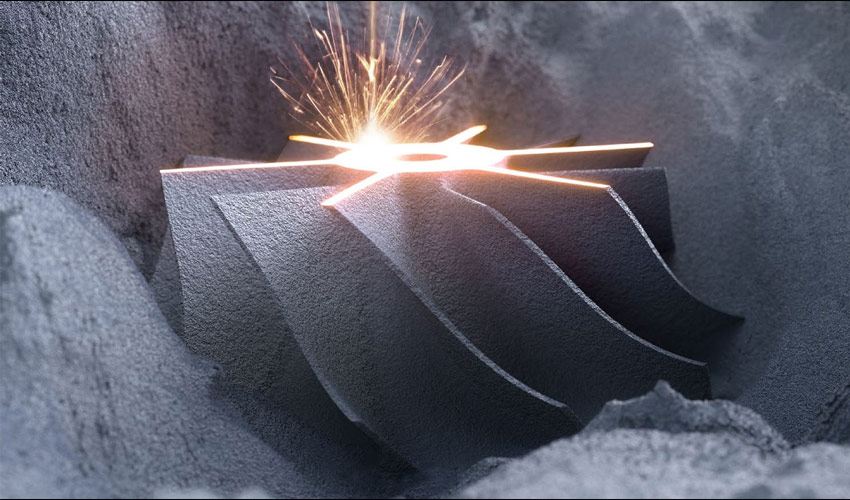SLS (Selective Laser Sintering): SLS uses a high-powered laser to selectively fuse a bed of powdered material (usually nylon or other thermoplastics) layer by layer, creating a 3D object. The un-sintered powder acts as support material and helps hold the object in place during the printing process. After the printing is complete, the object is removed from the powder bed and any excess powder is cleaned off. SLS is particularly well-suited for creating complex geometries and functional parts with high strength and durability.

EOS FORMIGA P110
The EOS Formiga P110 is a Selective Laser Sintering (SLS) 3D printer that uses a high-powered laser to selectively melt and fuse layers of powdered material, such as plastics, metals, or ceramics, to create 3D objects. As much as several materials could be used to produce parts with using EOS Formiga P110 we have two licensed material which are PA 2200 and Alumide.
SLS is a type of additive manufacturing technology that works by using a laser to selectively melt and fuse layers of powdered material together. The process starts by spreading a thin layer of powder over a build platform. The laser then traces the shape of the object to be printed, melting and fusing the powder together to form a solid layer. The platform is lowered by a fraction of a millimeter, and the process is repeated, layer by layer, until the object is complete.
The EOS Formiga P110 is a high-quality, industrial-grade 3D printer that is ideal for producing complex and durable parts with high accuracy and repeatability. It is designed for use in a variety of industries, including aerospace, medical, automotive, and consumer goods.
The Formiga P110 has a build volume of 200 x 250 x 330 mm and can print with a range of materials, including polyamide (PA), alumide, and other plastic and metal powders. It also features a high-resolution scanning system, advanced software for optimizing print parameters, and a user-friendly interface for easy operation.
For further information please check their website:
https://www.eos.info/en/industrial-3d-printer/plastic/formiga-p-110-velocis


MATERIALS
-
ALUMIDE
Alumide is a composite material used in 3D printing that combines the properties of aluminum powder and polyamide (nylon) powder, and it has the following mechanical properties:
Tensile Strength: Alumide has a tensile strength of around 35-45 MPa (megapascals), which makes it relatively strong and suitable for producing functional parts.
Flexural Strength: Alumide has a flexural strength of around 60-80 MPa, which makes it suitable for producing parts that need to withstand bending or twisting forces.
Impact Resistance: Alumide has a good impact resistance, typically around 20-30 kJ/m2, which makes it suitable for producing parts that need to withstand sudden impacts or shocks.
Hardness: Alumide has a relatively low hardness compared to other metal-like materials, typically around 60-70 Shore D, which makes it more flexible and easier to process
Elastic Modulus: Alumide has a relatively low elastic modulus of around 1500-1700 MPa, which means it is less stiff than some other 3D printing materials.
Overall, Alumide has good mechanical properties that make it a popular choice for producing parts with a metallic appearance and good strength-to-weight ratio. However, its mechanical properties are not as high as some other 3D printing materials, such as metals or high-performance plastics, and it may not be suitable for all applications.
-
PA 2200 (NYLON)
PA 2200 is a nylon powder material used in selective laser sintering (SLS) 3D printing technology, and it has the following mechanical properties:
Tensile strength: PA 2200 has a high tensile strength, typically ranging from 45-55 MPa (megapascals), which makes it suitable for producing functional parts that require strength and durability.
Flexural Strength: PA 2200 has a flexural strength of around 70-85 MPa, which makes it suitable for producing parts that need to withstand bending or twisting forces.
Impact Resistance: PA 2200 has a good impact resistance, typically around 10-15 kJ/m2, which makes it suitable for producing parts that need to withstand sudden impacts or shocks.
Hardness: PA 2200 has a Shore D hardness of around 74-78, which makes it relatively hard and suitable for producing parts that need to resist wear and tear.
Elastic Modulus: PA 2200 has a relatively high elastic modulus of around 1700-1900 MPa, which means it has good stiffness and can maintain its shape under load.
Overall, PA 2200 has excellent mechanical properties that make it a popular choice for producing functional parts, especially in industrial and engineering applications where strength, durability, and impact resistance are critical.
